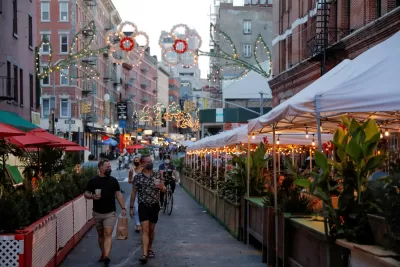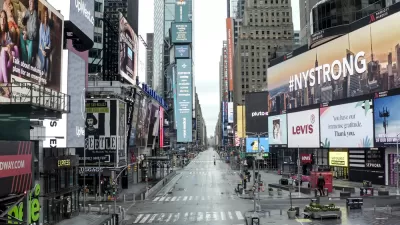At the onset of the pandemic, certain media figures were quick to jump on the bandwagon of anti-urbanism. While many of the anti-urban predictions failed to come about—neither did the problems of cities disappear.

Emily Badger writes to evaluate the lessons from one of the pandemic's most persistent and frequently fraught debates: Will the Covid 19 pandemic destroy the urban way of living in the United States?
From the outset of the pandemic, many took to the pages of mainstream media and social media to cast blame and predict dire consequences. "The pandemic promised nothing short of the End of Cities, a prophecy foretold by pundits, tweets and headlines, at times with unveiled schadenfreude," writes Badger.
Planetizen scrambled to keep up with the narrative at the beginning of the pandemic, gathering the discussion of pandemic planning and the consequences of Covid-19 for cities in a regular compendium. The discussion about the "End of Cities" frequently found its ways into our headlines.
- Debating the Future of Cities, and Urban Density, After the Pandemic (March 2020)
- Density Debate Rages Alongside the Pandemic (April 2020)
- The Media Can't Stop Talking About the End of Cities (September 2020)
Why was this prediction so alluring, asks Badger? To get at an answer, Badger and the team at The Upshot asked more than a dozen historians, economists, sociologists and urban policy experts about the staying power of the End of Cities narrative and about the "deep-rooted discomfort — suspicion, even — about urban life in America."
Experts cited in the story include:
- Eric Klinenberg, a sociologist at N.Y.U.
- David Schleicher, a Yale Law School professor
- David Madden, a sociologist at the London School of Economics
- Sara Jensen Carr, a professor of architecture, urbanism and landscape at Northeastern University
- Jason Barr, an economist at Rutgers
- David Albouy, an economist at the University of Illinois at Urbana-Champaign
One of the respondents say anti-urbanism is an American religion. Another says urban residents who left the city turned their story into a self-fulfilling prophecy. "'Cities are over,' in other words, is a convenient conclusion if you have decided they are over for you," writes Badger.
Importantly, Badger includes the insight of Madden, who points out that even urban boosters are making similar mistakes of bias.
"'The opposite of the decline narrative is a kind of urban boosterism which holds that after the pandemic, the dominant urban growth model of the past 15 years or so can continue, with a few tweaks here or there,' wrote Professor Madden, at the London School of Economics. That would be mistaken, too…"
All the pre-existing problems of expensive, unequal cities remain, and many have been exacerbated in ways that have not yet become apparent.
"In the end, the challenges of cities will persist, just as cities themselves will. And it seems to be folly to imagine away either," writes Badger.
FULL STORY: Covid Didn’t Kill Cities. Why Was That Prophecy So Alluring?

Planetizen Federal Action Tracker
A weekly monitor of how Trump’s orders and actions are impacting planners and planning in America.

Congressman Proposes Bill to Rename DC Metro “Trump Train”
The Make Autorail Great Again Act would withhold federal funding to the system until the Washington Metropolitan Area Transit Authority (WMATA), rebrands as the Washington Metropolitan Authority for Greater Access (WMAGA).

The Simple Legislative Tool Transforming Vacant Downtowns
In California, Michigan and Georgia, an easy win is bringing dollars — and delight — back to city centers.

The States Losing Rural Delivery Rooms at an Alarming Pace
In some states, as few as 9% of rural hospitals still deliver babies. As a result, rising pre-term births, no adequate pre-term care and "harrowing" close calls are a growing reality.

The Small South Asian Republic Going all in on EVs
Thanks to one simple policy change less than five years ago, 65% of new cars in this Himalayan country are now electric.

DC Backpedals on Bike Lane Protection, Swaps Barriers for Paint
Citing aesthetic concerns, the city is removing the concrete barriers and flexposts that once separated Arizona Avenue cyclists from motor vehicles.
Urban Design for Planners 1: Software Tools
This six-course series explores essential urban design concepts using open source software and equips planners with the tools they need to participate fully in the urban design process.
Planning for Universal Design
Learn the tools for implementing Universal Design in planning regulations.
Smith Gee Studio
City of Charlotte
City of Camden Redevelopment Agency
City of Astoria
Transportation Research & Education Center (TREC) at Portland State University
US High Speed Rail Association
City of Camden Redevelopment Agency
Municipality of Princeton (NJ)





























